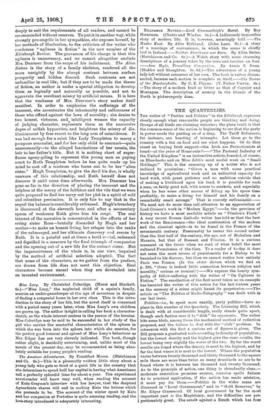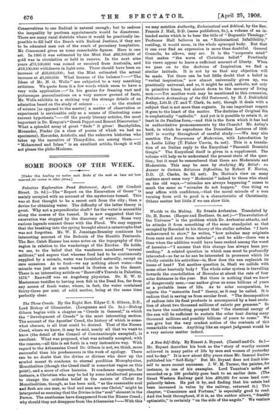THE QUARTERLIES.
THE writer of "Parties and Politics" in the Edinburgh expresses clearly enough what reasonable people are thinking and doing. Groups of all kinds are claiming victories; the plain truth is that the common-sense of the nation is beginning to see that the party in power needs the putting on of a drag. The Tariff Reformers, for instance, are boasting of triumphs. Let them go to the country with a tax on food and see what happens. Or do they count on buying Irish support—the Irish are Protectionists at heart—at the price of Home-rule ?—" The Pastoral Industry of the United Kingdom" is an instructive article, founded, of course, on Blue-books and on Miss Jebb's most useful work on "Small Holdings." This is the summing up of a writer who is not inclined to pessimism : "Given a man with some practical knowledge of agricultural work and an unlimited capacity for hard work, with great patience and no ambition outside that of making a livelihood upon his land, it is possible for such a man, on fairly good soil, with access to markets, and especially when he has some other means of filling up his spare time profitably, to make a living for himself and his family on a remarkably small acreage." That is scarcely enthusiastic.— We need not do more than call attention to an appreciation of Lord Cromer's work in "Modern Egypt."—In the province of history we have a most readable article on "Pension's Flock." A very recent Roman Catholic writer has told us that the best work of the Renaissance—the ideal combination of the modern and the classical spirit—is to be found in the France of the seventeenth century. Presumably he means the second rather than the first half of the century, the age, not of Richelieu and Mazarin, but that of Bossuet and Fenelon. It is a curious comment on the thesis when we read of what befell the most cultured Frenehman of the time. To a reader of to-day it does not seem the most severe of punishments for a Bishop to be banished to his diocese; but then we cannot realise how entirely Paris was France. (Is the °biter dictum which we find on p. 293, "there is indeed little connection between religion and morality," serious or ironical ?) —We express the hearty sym- pathy of fellow-suffering with the writer of "On Ugliness in Fiction." The recollection of the first novel taken as an example has haunted the writer of this notice for the last sixteen years as the memory of a crime might haunt its perpetrator.—The article on "The Politics of Radio-Telegraphy" was dealt with in our last issue.
Politics—i.e., to speak more exactly, party politics—have no place in this number of the Quarterly. The Licensing Bill, which is dealt with at considerable length, really stands quite apart, though each faction uses it to " dish " its opponents. The writer hits some blots, among them the mechanical method of reduction proposed, and the failure to deal with the "club" problem. In connexion with the first a curious set of figures is given. The Bill proposes a graduated scale according to density of population ; but the lowest density and the highest give the same results, the lowest being very slightly the worse of the two. By far the worst results are found where the density is next to the highest, and by far the best where it is next to the lowest. Where the population varies between twenty thousand and thirty thousand to the square mile there are more than twice as many drunkitrds as are to be found where it is between ten thousand and twenty thousand. As to the principle of action, one thing is abundantly clear,— moderate restriction promises success, coercion spells failure. As to practical application, if the nation has made mistakes, it must pay for them.—Politics in the wider sense are discussed in "Local Government," and in "Gold Reserves" by Mr. Edgar Crammond. Of local government by far the moat important part is the Magistracy, and the difficulties are prd- portionately great. The revolt against a Bench which has font
Conservatives to one Radical is natural enough ; but to redress the inequality by partisan appointments would be disastrous. There are many rural districts where it would be practically im- possible to fill half the Bench with Radical Justices, if they are to be educated men out of the reach of pecuniary temptation. Mr. Crammond gives us some remarkable figures. Here is one set. In 1895 it was estimated by the Mint that £62,500,000 of gold was in circulation or held in reserve. In the next nine years £73,100,000 was coined or received from Australia, and .219,100,000 withdrawn in light coin. There should have been an increase of 53,000,000; but the Mint estimated the actual increase at -£1,000,000. What became of the balance ?—" The Ideas of Mr. H. G. Wells" are subjected to a very searching criticism. We quote from it a few words which seem to have a very wide application :—" In his genius for framing vast and picturesque generalisations on a very narrow ground of facts. Mr. Wells exhibits in a striking way the strange details of an education based on the study of science to the student of science [as opposed to the master] a matter of observation or experiment is serviceable only as a means of illustrating some current hypothesis."—Of the purely literary articles, the most important is Dr. Kenyon's "Greek Papyri and Recent Discoveries." What a splendid array of great " finds " it gives ! Bacchylides, Menander, Pindar (in a class of poems of which we had no specimens), Herondas, Aristotle, and the unknown historian who takes up the narrative of Thucydides, are among them.— " Mohammed and Islam" is an excellent article, though it will not please the philo-Moslems.























































 Previous page
Previous page